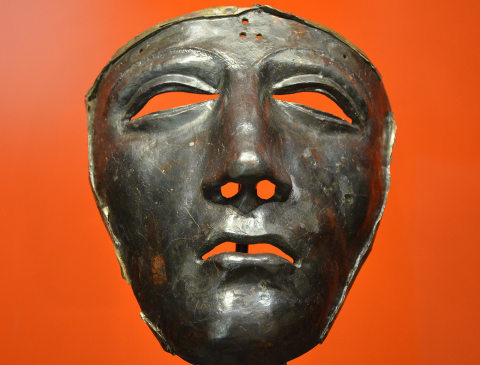Nina Papathanasopoulou
May 29, 2020
The new Classics Everywhere initiative, launched by the SCS in 2019, supports projects that seek to engage communities worldwide with the study of Greek and Roman antiquity in new and meaningful ways. As part of this initiative the SCS has been funding a variety of projects ranging from reading groups comparing ancient to modern leadership practices to collaborations with artists in theater, music, and dance. In this post we focus on digital projects that engage with ancient texts and discuss the study of Classics during the coronavirus pandemic and beyond.
The following Classics-related projects are available digitally at no cost and offer a variety of experiences for a wide range of audiences: reflections on how COVID-19 has affected the study of Greco-Roman antiquity, via a podcast and video series; engagement with some of the marginalized voices in Classics, through a special issue on first generation Classicists in the online journal Eidolon; an audio-visual performance of pandemic-related ancient texts from the University of Nebraska at Lincoln; and a fun activity for crossword devotees by dedicated Classics high school seniors.
A new Classics-based podcast series, Inside Classics, has been launched by Ayelet Haimson Lushkov, Associate Professor of Classics at the University of Texas at Austin, in collaboration with two Classics graduating seniors, Sam Ross ’20 and Cassandra Winkley ’20. The podcast provides behind-the-scenes information on Classics-related projects, and explores how contemporary issues manifested in the ancient world. According to Haimson Lushkov, the creators hope “to democratize access to, and expand an understanding of, Classics as a professional field,” while also engaging and providing work opportunities to talented members of her community. The project is intended for a broad audience, and could also be helpful for teachers who want to enrich class with supplemental materials. SCS funding has been used to hire a sound editor, while a video editor will be needed when social distancing rules permit the creation of the videos.
Haimson Lushkov, Ross, and Winkley started this project shortly before the pandemic hit so they quickly decided to make some adjustments: they have decided to devote the first season of 10 weekly episodes to COVID-19 related issues. The first episode, for example, scheduled to be released June 3, deals with Classics projects that were suddenly interrupted by the virus. In the first of a series of interviews, archaeologist Adam Rabinowitz discusses how shutting down two archaeological digs has impacted on scholars, students, and staff, as well as the project as a whole. Then Pramit Chaudhuri, Associate Professor of Classics and co-director of the Quantitative Criticism Lab, a collaborative project to apply computational and biological approaches to the study of literature, talks about his experience cancelling a conference and its effects on the scholarly community. The second episode centers on health and diseases in the ancient world, and deals with osteo-archaeology, and the kind of traces that diseases leave on the human body. The third episode interviews Classics professors and students who were spending their semester working in Italy – from the American School in Rome to a dig in Pompeii – and discusses how the pandemic disrupted their work or studies, and the impact their abrupt and mandated departure from Italy had socially and emotionally for their community, colleagues, and friends. Future episodes will focus on ancient grain supplies and the current trend in baking; on online pedagogy; on the impact of the coronavirus pandemic for graduate students; and on disease narratives in Greek and Roman epic.
Figure 1: The Dying Gaul masked. The image that will be used for the Inside Classics podcast by Haimson Lushkov and her team.
The podcast will change gears when social distancing regulations are loosened, hopefully during this summer. It will then be possible to complement the podcasts with a series of 5-minute videos, each of which illustrates a technical subject, such as Roman aqueducts, trench architecture, Hoplite armor, and Linear B. By introducing each podcast on these topics with a short video, the creators hope to enhance both the interest and educational value of the offerings.
The Classics Everywhere Initiative has also supported Eidolon’s special issue on first generation classicists, an issue focusing on the experiences of classicists who are the first in their families to attend college or graduate school. This issue will consist of 4 articles over the span of 4 weeks and will include personal reflections on Western colonialism and American imperialism; analyses of the tensions between elite culture and working-class classicists in the UK; and narratives about learning to read Latin and Greek as a victim of intergenerational trauma. The first article, Western Imperialism in the Classics Classroom, was published on May 18. It centers on the narratives of two first-generation Classicists: Ashley, a member of the Wiyot tribe from an island off the coast of California, and Kiran, who has ties to the Mindanao region of the Philippines. These narratives make vivid the ways in which their “classmates’ ignorance of America’s imperialist history affected [their] experiences in the classics classroom.”
Tori Lee, one of Eidolon’s editors and a PhD candidate in Classical Studies at Duke University, explained Eidolon’s inspiration and aim for the project in the following words:
Seeing the growth of organizations like the Sportula, the Classics and Social Justice group, and the AAACC reinforced our belief that the field wants to hear from more voices than ever before. We're acutely aware of the challenges that marginalized scholars face when they try to break into classical academia; these roadblocks have become increasingly visible even at our own professional conferences. We want to highlight first-gen classicists because their voices can be easily overlooked in a discipline where historically privileged groups speak so loudly.
According to Lee, Eidolon hopes that their special issue will inspire classicists to adopt inclusive practices and “to work with even more urgency towards creating as diverse a field as possible.”
Another Classics Everywhere funded project that is available digitally for public viewing is the Homerathon of the University of Nebraska at Lincoln (UNL), this year revised due to COVID-19 and renamed A Panhellenic Pandemic Performance. This year’s student-run performance centered on readings related to the COVID-19 pandemic: Book 1 of the Iliad, in which Apollo casts a plague upon the Greeks and spurs them into action; Oedipus’ handling of the plague in the opening of Sophocles’ Oedipus Tyrannus; and Thucydides’ famous account of the plague that devastated Athens in 430 BCE. The performance is introduced by Leirion Gaylor Baird, the mayor of Lincoln, who describes this year’s readings as a “suitable focus for this year’s Homerathon coming to you during an epic moment in all of our lives.” Baird also expresses her joy in seeing that “the tradition continues in new innovative ways and in spite of our current circumstances.” Associate Professor Mike Lippman and Lecturer Rachel Hart, both in the Department of Classics and Religious Studies at UNL, co-organized this year’s event and introduced the performance’s sections by giving background information for each text.
Figure 2: Screenshot of Leirion Gaylor Baird, Mayor of Lincoln, introducing UNL’s Digital Homerathon: A Panhellenic Pandemic Performance.
The Panhellenic Pandemic Performance is narrated primarily by UNL students, faculty, and staff, with a special guest appearance by Stanley Lombardo, the well-known translator of the Iliad, Odyssey, and the Aeneid. Rather than showing visual footage of each reader performing their assigned section, the Homerathon team decided to complement the sound recording with images of ancient Greek landscapes, monuments, and art, to assist listeners in mentally visiting the world of the ancient Greeks.
Amy Goodburn, Sr. Associate Vice Chancellor and Dean of Undergraduate Education at UNL, congratulated the Homerathon team on behalf of the University’s administration and noted that “the focus on the pandemic is a wonderful example of how we can learn so much from the humanities as we navigate contemporary experiences.” In her closing remarks to the performance, Ellie Churchill ‘19, one of this year’s student leaders at UNL, expressed her satisfaction in the project and underlined that “it’s vital during these times to look back at history and to band together.”
One thousand miles eastward, Sherri Madden, Latin and Greek teacher at Master’s Academy in Charlotte, NC, has long been engaging her classical languages students to be active in community outreach. For Madden, teaching involves helping students to develop important life skills: teamwork, leadership skills, problem-solving, and a desire to serve the community. This year, one of Madden’s senior high school students, an aspiring mathematician named Genevieve Romanelli, found inspiration in the New York Times Crossword puzzles. Romanelli analyzed the clues to 57 NY Times Crossword puzzles. Recording the number of classics-related clues and the ratio of classics-related clues to total clues, she found a positive correlation between the number of classical clues and the difficulty of the puzzle. Romanelli decided to collaborate with her classmates to create their own classical crossword puzzle and, with funding from Classics Everywhere, planned to distribute it to all local Charlotte-Mecklenburg libraries as well as to a few neighboring county libraries. “I decided to create the crossword because I wanted an approachable introduction to classics. Many people have no connection to the field, and I wanted to inspire such people to learn more,” Romanelli explained.
Figure 3: Genevieve Romanelli analyzing the NYTimes Crossword Puzzles. Photo by Sherri Madden.
Though Madden’s students had prepared hard copies of the completed puzzle by the time the pandemic hit, the general closing of libraries prevented distribution of the puzzle to all except two of the libraries. Though COVID-19 has forced their project to a halt for now, as things reopen Madden’s students will be back at work distributing their puzzle to the libraries. They have also decided to make an electronic copy available and are in communication with the libraries about ways to distribute it to library members and friends. A copy of the crossword can be found here.
Aislinn Niimi, a senior student of Madden’s who collaborated with Romanelli, expressed her joy and gratitude for the experience: “Coming up with clues forced me to think creatively and tie various Classical themes to other common-knowledge words or ideas. I hope other people have fun solving this puzzle and our clues!”
The challenges to global societies brought on by COVID-19 can be seen in microcosm in the world of Classics, yet Classics also offers its own particular set of problems and opportunities. If Ellie Churchill is right to find that “it’s vital during these times to look back at history and to band together,” the contributors to Eidolon’s special issue remind us that asking “whose history?” must always be part of any truly successful banding together, and that Classicists have both the training and the responsibility to investigate such questions. As the launching of Inside Classics demonstrates, and the welcome enthusiasm of Sherri Madden’s students, even the era of quarantine affords opportunities to forward-thinking Classicists to connect us, and reach out to new and broader audiences.
Header Image: Kalkriese face mask for Roman cavalry helmet, Museum und Park Kalkriese, Germany (Image by Carole Raddatio under a CC-BY-SA 2.0).
Authors


